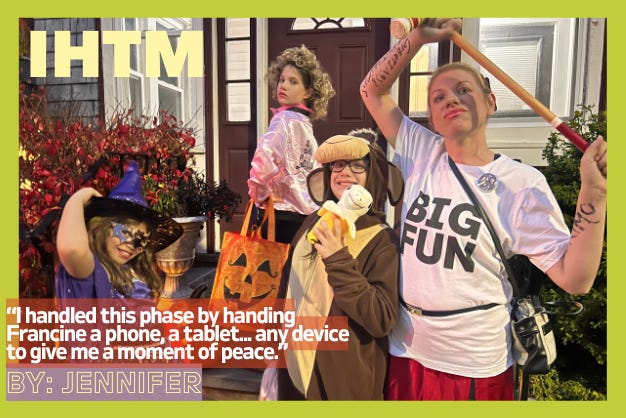It Happened To Me: I Was An Emotionally Absent Mom Until My 10-Year-Old Got Hospitalized For Punching Through A Glass Door
A suicide threat, an ER visit, and inpatient therapy for our young daughter changed our family forever.
By: Jennifer Dines

In a white, windowless room, I lie on a queen-size beanbag as Francine, one of my ten-year-old twins, layers weighted blankets on top of me and then belly flops onto the pile. It knocks the wind out of me, but only for a second.
“Francine, did you ask your mom permission before you jumped?” asks Audrey, one of our family therapists.
And an “OOP! Sorry, Mom!”
She sounds like a cartoon when she says this, and I can’t help but laugh.
Francine’s twin sister, Sofia, shrieks through the fabric of a giant cocoon-like swing suspended from the ceiling as my husband, David, pushes her like one of those stomach-dropping pirate ship rides at an amusement park.
My youngest daughter, Carolina, jumps up and down on a mini-trampoline while dribbling a medicine ball and venting about her day to Anna, the other therapist.
Our family spends two hours each Friday afternoon in this space, called a SMART room, where Audrey and Anna teach our family communication and coping skills through movement. We play theater games, like mirroring and charades. We do puzzles, make slime, and paint. And we get active with one another. My favorite activity was the day my husband and I whipped a giant exercise ball at one another while standing on balance boards.
These days, inside and outside the SMART room, our family life feels manageable, enjoyable even. But it has taken most of the current school year in intensive therapy to arrive here.
Our journey towards family mental health began last October…with a SMASH.
Shards of glass glittered on the hardwood floor of our home office, sparkling like diamonds in the autumn sunlight that streamed through the window. But what had happened? I felt so shocked and confused by all this broken glass that I journey outside myself, floating above the room.
A French door with a grid of fifteen rectangular panes of glass separates the office from the long hallway of our apartment. Only now, there were fourteen panes, and one wooden mouth full of jagged glass teeth.
“I’m sorry,” Francine wailed, “I’m so sorry.” Yet her words seemed slow and muffled. I drifted farther and father away.
I spotted Francine on the floor of the hallway, rumpled up, head on her knees with her curtain of dark hair obscuring her face. On one gray sleeves of Francine’s long-sleeved Hamilton t-shirt, patches of blood seeped outwards.
Blood. My baby was bleeding. This brought me right back down to Earth.
I leapt across the shards on tiptoe, sidestepped Francine, tossed on a hoodie and a pair of sneakers, and grabbed my purse, shouting down the hall:
“Francine, honey. It’s okay. I’m taking you to the emergency room. We are going to get this taken care of.”
A sense of calm and focus overtook me. My sole purpose in life at that moment was to get Francine the care she needed.
“Francine’s needs were serious, and they required serious treatment.”
Before Francine put her fist through the window, she had screamed for the better part of an hour about all of my failings:
“I’ve been gone for DAYS, and you don’t even want to talk with me.”
“You care more about your students than you care about me.”
“You’re barely a mother. You can’t even take a moment for us.”
Francine wasn’t wrong. When Francine and Sofia walked in the door from their fifth grade overnight camping trip earlier that afternoon, Carolina embraced them, and David offered to make them whatever they wanted for dinner. But I said only the briefest of hellos. My butt remained glued to the swivel chair, my eyes fixated on my computer.




